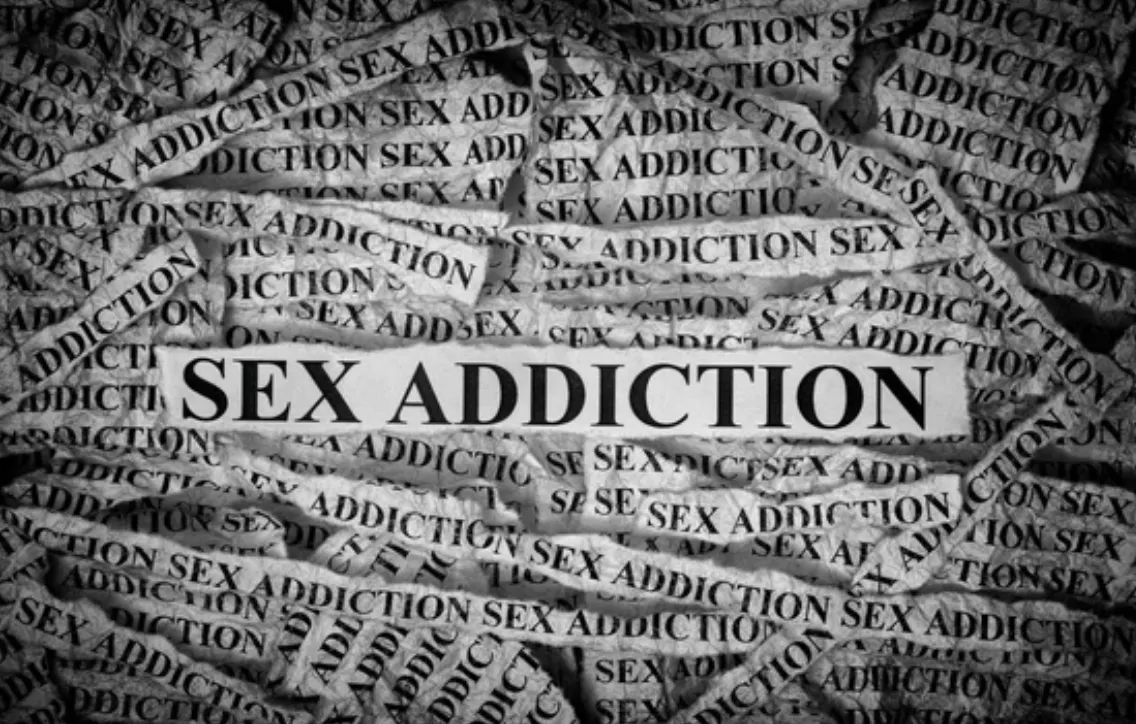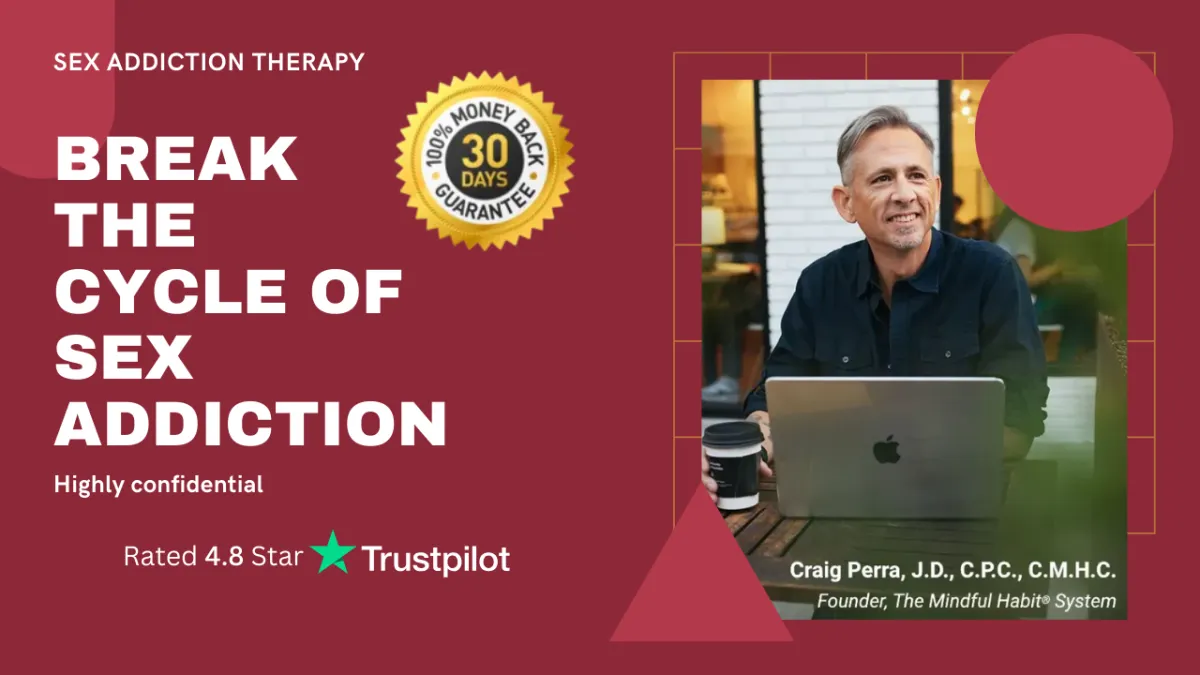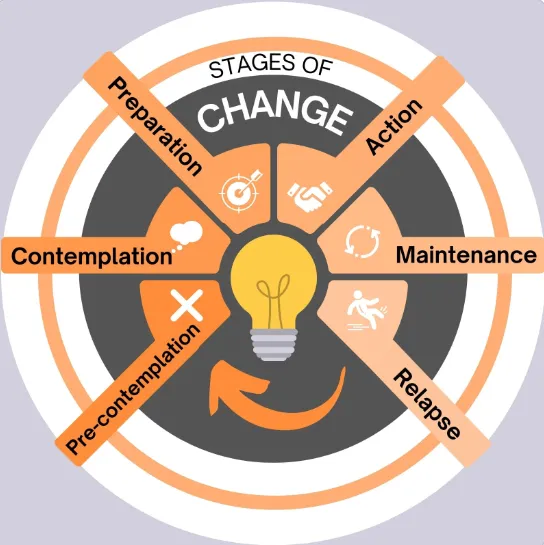Call Us On (877)-585-0677 To Speak To An Expert Today!
SEX Withdrawal Symptoms
Do sex addicts experience withdrawal symptoms like those with other addictions?
Short Answer: Absolutely. Sex addiction isn’t about sex—it’s about using sex to numb and escape from deeper pain. It's an attempt to fill a void, often ignoring the consequences. When you remove this numbing behavior, it can lead to significant emotional and physical distress.
The formula: Severe sex addiction + childhood trauma + underlying mental health issues (anxiety, stress, low self-esteem, depression, etc ..) = the greater and more severe the withdrawal symptoms.
Here’s the thing … Sex addiction isn't just an overindulgence in sexual activity; it's a profound intimacy disorder, often misunderstood and stigmatized. At its core, sex addiction—and its frequent counterpart, porn addiction—are unhealthy coping stragegies, ways to manage deeper, unresolved pain and mental health issues.
Just like substance addiction, where a person might turn to drugs or alcohol to escape emotional pain, sex addiction is often an attempt to soothe internal wounds - in ways that ultimately cause disastrous consequences.
But what happens when you decide to stop? What happens when the sex addiction withdrawal begins?The journey away from these behaviors isn't easy. In fact, it can trigger a range of withdrawal symptoms that are as complex and varied as those experienced during substance withdrawal.
Understanding what withdrawal from sex addiction looks like is crucial for anyone on the path to recovery. From intense physical discomfort to overwhelming emotional turbulence, this period of transition challenges every part of the mind, body, and spirit.
In this article, we’ll explore the multifaceted nature of sex addiction withdrawal. We’ll delve into the physical, psychological, and behavioral symptoms that can arise and why these symptoms can be so intense.
We’ll also examine the underlying mental health issues that fuel these addictions and how addressing these root causes can be the key to overcoming the addiction itself.
If you or someone you care about is struggling with sex addiction, understanding the withdrawal process is a vital step toward healing and reclaiming a healthier, more balanced life.
Ready to dive deeper? Let’s explore the withdrawal symptoms associated with sex addiction and the strategies to manage them effectively.
Craig Perra, the world-renowned founder of The Mindful Habit® System, approaches this issue with a humanized and empathetic style - he personally struggled for decades with sex, porn, and drug addiction.
His coaching is rooted in understanding the individual’s unique experience and offering compassionate support tailored to their needs rooted in neuroscience with a deep awareness of the underlying mental health issues.

Sex addiction is a multifaceted and complex condition: it is a self-esteem, anxiety, integrity, and intimacy disorder characterized by compulsive sexual behaviors that significantly disrupt daily functioning and relationships.
It goes beyond mere sexual desire, manifesting as an uncontrollable urge to engage in sexual activities despite adverse consequences. Sex addiction is often the symtom of deeper underlying mental health issues. As Craig Perra often says, “the behavior is the symptom … Always!!!”
Characteristics:
Individuals with sex addiction often exhibit an obsession with sexual thoughts, leading to behaviors such as excessive masturbation, PMO addiction, engaging in risky sexual activities like prostitution, massage parlors, infidelity/cheating, and withdrawal from commitments and responsibilities.
This disorder can result in intense feelings of shame, depression, and emotional isolation as the individual struggles to reconcile their actions with their values, morals, and self-image.

Neurochemical Basis:
At the heart of sex addiction lies the brain's reward system, primarily driven by dopamine, a neurotransmitter responsible for feelings of pleasure and reward.
In individuals with sex addiction, there is often a dysregulation of dopamine pathways.
Engaging in sexual activities leads to a surge of dopamine, reinforcing the behavior and creating a cycle of craving and reward.
However, and this is a massively big HOWERVER - we must note that the brain science behind compulsive sexual behavior is contraversial and inconclusive. There are many explainations for this, however, one reason is because there are many different types of “sex addiction.”
Because there are many different underlying mental health conditions that lead to the behavior of sex addiction (dishonesty, an ability to compartmentalize, lack of empathy, poor coping strategies, isolation, risky sex despite consquences), there are just as many neurochemical patterns in the brain.
Attributing sex addiction solely to dopamine grossly oversimplifies this intricate condition. In truth, sex addiction is driven by a complex network of neurochemical systems beyond dopamine, including opioid receptors, neuropeptides like oxytocin and corticotropin-releasing factor (CRF), insulin signaling, and brain-derived neurotrophic factor (BDNF).
These systems interact in nuanced ways to modulate reward processing and stress responses, ultimately fostering the development and reinforcement of addictive behaviors.
And this complexity does not even account for the neurochemical processes involved in other underlying diagnosable mental health conditions like depression, anxiety, and bipolar disorder, for example … and, there are many more.
Psychological Factors:
Sex addiction often originates from deep psychological wounds, with childhood trauma, emotional neglect, and abuse frequently playing a pivotal role in its development.
These experiences can lead to the formation of narcissistic traits, such as a lack of empathy and an ability to compartmentalize, which allow compulsive sexual behaviors to thrive.
Individuals who suffer such trauma may use these behaviors as a coping mechanism to manage unresolved pain, while simultaneously seeking intimacy and validation in dysfunctional ways.
This creates a complex dynamic where psychological wounds not only drive the addiction but also foster traits that make recovery particularly challenging.

A Personal Note From Our Founder, Craig Perra
I know what it’s like to be in the grip of sex addiction—I was that guy, using sex to numb deep pain, lying to my wife, and running from my demons. But sex addiction isn’t about the sex; it’s about escaping unresolved trauma and broken, unmet needs. My journey taught me that to overcome addiction, you must confront your inner demons and understand (and heal) the roots. I often say, “the cure is the aggressive pursuit of a great life!”
With The Mindful Habit® System, we don’t just stop the behavior; we dig deep to transform your life. We create a safe space to face your truth, rewiring your brain and building habits that make you want to stay in the life you’re creating. If I could turn my pain into purpose, so can you. Let’s reclaim your life together.

What Is Sex Addiction Withdrawal?
Sex addiction withdrawal is a complex and challenging journey, marked by the difficult process of stopping compulsive sexual behaviors and managing the intense physical, psychological, and emotional symptoms that follow.
While there is ongoing scientific debate about whether true withdrawal symptoms exist for sex addiction, what’s clear is that quitting these behaviors can trigger significant distress.
Unlike with drugs or alcohol, stopping compulsive sexual activity isn't directly fatal—no one dies from abstaining from sex. However, the absence of this coping mechanism can intensify underlying mental health issues, making the withdrawal process highly distressing.
Research shows that the psychological impact of withdrawing from sex addiction can be severe, often leading to depression, anxiety, and other emotional disturbances (Kraus et al., 2016, Journal of Behavioral Addictions).
In some extreme cases, the emotional toll, particularly when compounded by feelings of shame or the shock of being exposed, can lead to suicidal ideation, attempts, or even suicide. This is why it is crucial for anyone experiencing such intense symptoms to seek immediate professional help.
It is essential to understand that compulsive sexual behaviors are often symptoms of deeper, unresolved issues. Withdrawal isn't just about stopping the behavior; it’s about confronting the pain and trauma that fuel it.
Approaching sex addiction withdrawal with a holistic perspective allows us to address both the behavior and the underlying emotional wounds that drive it, paving the way for genuine healing and recovery.
Simple Rule: if you can’t stop on your own, despite your shame, the risks, and the consequences of the behavior, you need professional help.

Sex Addiction Withdrawal: Understanding the Symptoms
Withdrawing from sex addiction is a complex process that involves coping with a range of physical, psychological, and behavioral symptoms as the body and mind adjust to the absence of compulsive sexual behaviors.
It's important to recognize these symptoms and understand how they manifest to effectively manage and overcome them.
Physical Symptoms of Sex Addiction Withdrawal
When someone stops engaging in compulsive sexual behaviors, their body can undergo significant physical changes.
Symptoms can include:
a. Heightened Anxiety
b. Increased Stress
c. Irritability
d. Headaches
e. Physical Pain
f. Sleep Disturbances
g. Extreme Fatigue
h. Extreme Hyperactivity
i. Digestive Issues
j. Restlessness
k. Heart Palpitations
l. Sweating
m. Changes In Appetite
n. Tremors
o. Cold or Flu-Like Symptoms
p. General Malaise
These symptoms often occur because the body is adjusting to the absence of the dopamine surges that came with these addictive behaviors as the underlying mental health issues worsen.
As a result, stopping abruptly can exacerbate underlying mental health issues, making the withdrawal process physically demanding.
Psychological and Behavioral Symptoms:
The psychological and behavioral effects of withdrawing from sex addiction can be overwhelming and deeply unsettling for some.
As the mind emerges from the numbness and isolation of addiction, a range of sex withdrawal symptoms can surface, each reflecting the struggle to adapt without the once-relied-upon coping mechanism.
This awakening can unearth buried emotions and unresolved mental health issues, causing intense psychological distress and manifesting in various ways:
Depression: The absence of addictive behaviors can trigger deep depressive episodes, leaving individuals feeling an emotional void and profound sadness.
Anxiety: Anxiety levels may increase sharply, manifesting as constant worry, panic attacks, or a persistent sense of dread.
Mood Swings and Irritability: Rapid mood changes and irritability are common as the brain struggles to stabilize its chemical balance without the addictive behavior.
Trouble Focusing: The brain may become preoccupied with the absence of the addiction, making concentration on daily tasks challenging (a symptom of ADHD can be hypersexuality).
Feelings of Guilt and Shame: As individuals confront the reality of their past behaviors, they may experience intense guilt and shame.
Social Withdrawal and Emotional Numbness: To cope with the overwhelming psychological symptoms, some may withdraw from social interactions or feel emotionally numb.
Intense Sexual Urges: As the brain grapples with the loss of its dopamine fix, individuals may experience a surge in sexual urges or fantasies, a desperate attempt by the mind to reclaim the high it once knew.
Nonexistent Libido: On the flip side, the overwhelming fear, shame, or shock of hitting a new low can lead to a sudden drop in libido. This might trick the addict into thinking they’re on the path to recovery, but it’s often a temporary lull. Without addressing the deeper, underlying issues driving the addiction, this false sense of security won’t last.
Changes in Sleep Patterns: Withdrawal can significantly disrupt sleep, causing either insomnia or excessive sleeping, as the body and mind attempt to cope with the absence of the addiction.
Craig Perra’s Client Stories:
Watch What Experts And Customers Have To Say About The Mindful Habit System...
Before I got involved with Craig & Mindful Habit, my life was not in a good place. I had many controlling and compulsive bad habits that was creating trouble in my life and in my relationship with my wife.
My bad behavior had gotten to the point where my wife was considering not being in the relationship any longer. That's when I came across Craig Perra online and started the program with him.
The program from Craig was an amazing program. It taught me how to love and respect myself again. My life and relationship with my wife has never been better.
I'm very thankful to Criag for the Mindful Habit. It has saved our marriage.
- Steven & Maria
For over 12 years, I've had constant affairs, porn addiction and was spending money in areas that I didn't have to spend money.
I realized I had to make a change in my life as it was seriously affecting my relationship.
This program worked for me because of the exercises in the workbook, the weekly group meetings which provided me insights on the issues that I experienced.
I was able to change the direction in my life. I no longer am affected by the negative triggers or focus issues.
- Matthew
The Withdrawal Process: Stages and Expectations
There is limited scientific consensus specifically on the phases of sex addiction withdrawal. This is because the underlying issues driving the addiction are so diverse.
However, some studies discuss the broader framework of addiction, which may provide insights relevant to sex addiction.
General Phases of Addiction: Addiction, including sex addiction, is often conceptualized in stages similar to substance addictions. These stages typically include binge/intoxication, withdrawal/negative affect, and preoccupation/anticipation (craving) (Koob & Volkow, 2021). Withdrawal phases are characterized by a negative emotional state that follows the cessation of addictive behaviors.
Psychological and Emotional Aspects: Some literature suggests that individuals in the second stage of sex addiction recovery often need to work through deep-seated emotional issues, such as narcissism, to move toward emotional sobriety. This implies that the withdrawal process is not just physiological but also involves significant psychological components (Nixon & Theriault, 2012).
Craig Note: Let’s be real: most sex addicts display narcissistic traits that cannot be ignored. The stronger the addiction, the more profound the ability to compartmentalize, deceive, and disconnect from empathy.
It's simple: the deeper the addiction runs, the more critical it becomes to confront these narcissistic tendencies head-on. These traits are what fuel the addictive behavior, allowing it to thrive unchecked. If we don't tackle this, true recovery remains out of reach.
At my rock bottom, I realized that I was a gas-lighting narcissist who could solicit an economically disadvantaged prostitute and go home and kiss my wife. I needed help and if you connect with what I’m saying then maybe I can help you.
Coaddiction and Relational Dynamics: Partners of sex addicts may also go through their own recovery phases, which involve addressing the emotional and relational impact of the addiction. This suggests that the withdrawal phase can have both individual and relational components that need to be addressed for comprehensive recovery (Tripodi, 2006).
Conclusion:
Recovery from sex addiction is not just about managing withdrawal; it's about reclaiming your life and stepping into a new reality where real, meaningful connections are possible.
Addressing the addiction and the underlying traits that fuel it—like narcissism, anxiety, depression, deception, and emotional disconnection—opens the door to profound personal growth and the chance to build incredible relationships. You can even safe your marriage and make it better!!! There is hope.
It's not an easy path, but it's a transformative one. By confronting these challenges head-on, you can break free from the cycle of addiction and create a life filled with authenticity, empathy, and love.
Remember, the journey to recovery is also a journey to becoming the best version of yourself—capable of experiencing deeper connections and living a life full of purpose and joy.
Craig Note: Broken men do broken things. You can fix this. The obstacle is the way. You can do it!! Despite common misconceptions, sex addiction is not a life sentence. The cure is the aggressive pursit of a great life.
Managing Triggers: A Key to Recovery
Managing triggers isn't just about avoidance—it's about mastery. In the sex addiction withdrawal process, understanding and effectively responding to triggers is crucial. Triggers can range from specific situations, people, or places to emotions that ignite the urge to revert to addictive behaviors.
The Mindful Habit system goes beyond mere identification of triggers; it empowers you to transform how you react to these triggers.
From Craig Perra, “through my system, I teach clients to recognize their unique habit cycles—the loops of thoughts, emotions, and behaviors that keep them stuck. By understanding these cycles, you gain the power to disrupt them.
We don’t just avoid triggers; we create a Trigger Response Plan that prepares you for those challenging moments. This plan includes mindful awareness techniques, stress-reduction practices, and specific, actionable steps you can take when confronted with a trigger.
It’s about building resilience, not avoidance, so you can face your triggers head-on with confidence and control.
The goal isn't just to resist the urge but to transform it—channeling the energy from destructive habits into constructive, life-affirming actions. By mastering your triggers, you take a critical step in breaking free from the chains of addiction and moving towards a life of purpose, joy, and authentic connection. This is how you thrive, not just survive.”

Coping Strategies and Treatment Options
Professional Help:
Seeking professional help is a cornerstone of effective recovery from sex addiction. Therapy provides structured support and evidence-based techniques to address the underlying issues contributing to addiction.
Cognitive Behavioral Therapy (CBT): CBT helps individuals identify and change negative thought patterns and behaviors. It’s highly effective in managing triggers and developing healthier coping strategies.
Internal Family Systems (IFS): IFS focuses on understanding and healing the different parts of oneself that drive addictive behaviors. It’s particularly useful for addressing childhood trauma and emotional neglect.
Brainspotting: This therapeutic approach helps access and process traumatic memories stored in the brain. By focusing on specific eye positions, clients can release deeply rooted emotional pain.
Specific Programs:
Programs like Boulder Recovery offer specialized care tailored to the needs of those struggling with sex addiction.
These programs often combine various therapeutic modalities, providing a comprehensive approach to treatment.
Craig Perra’s Mindful Habit System is another excellent resource, focusing on habit formation and mindfulness to support long-term recovery.
Self-help Strategies:
Developing a Relapse Prevention Plan: Creating a detailed plan to handle potential triggers and stressors can prevent relapse. This plan should include specific steps to take when faced with temptation and strategies to maintain motivation.
Engaging in Healthy Activities and Hobbies: Finding new, fulfilling activities can replace the time and energy previously spent on addictive behaviors. Physical exercise, creative pursuits, and volunteering are all great options.
Establishing Healthy Boundaries: Learning to set and maintain boundaries is crucial for protecting one’s mental and emotional health. This includes saying no to situations or people that might trigger addictive behaviors and creating a safe, supportive environment.
Support Networks:
Building a strong support network is essential for recovery. Group therapy provides a space to share experiences and gain insights from others facing similar challenges.
Supportive communities, whether in-person or online, offer encouragement, accountability, and a sense of belonging.
Medication:
In some cases, medication may be necessary to support recovery, particularly if there are co-occurring mental health issues like depression or anxiety.
Medications such as antidepressants or anti-anxiety drugs can help stabilize mood and reduce symptoms, making it easier to focus on therapy and self-help strategies. Naltrexone is sometimes prescribed to sex addicts to “lower the volume” of triggers and increase self control.
A local, qualified, healthcare professional can assess the need for medication and provide appropriate prescriptions.
Craig Perra’s approach emphasizes a balanced combination of professional help, self-help strategies, and strong support networks.
His philosophy is rooted in the belief that everyone has the power to change and build a healthier, more fulfilling life. By addressing both the symptoms and the underlying causes of sex addiction, individuals can achieve lasting recovery and personal growth.

Practical Steps for Managing Withdrawal Symptoms
Identifying Triggers:
Recognizing and understanding personal triggers is the first step in managing withdrawal symptoms. Focus on both the sexual and non-sexual triggers.
This involves:
Self-Reflection: Take time to reflect on past behaviors and situations that led to compulsive sexual activities. Journaling can be an effective tool for this.
Environmental Scanning: Identify places, people, and circumstances that prompt urges. Being aware of these external factors helps in avoiding or managing them.
Emotional Awareness: Pay attention to emotional states that trigger addictive behaviors, such as stress, loneliness, or boredom. Understanding these emotions can help in developing healthier responses.
Developing Coping Strategies:
Creating and implementing effective coping mechanisms is crucial for navigating withdrawal.
Practical advice includes:
Mindfulness Practices: Engage in mindfulness meditation or breathing exercises to stay grounded and present, reducing the intensity of urges.
Physical Activity: Regular exercise helps release endorphins, improving mood and reducing stress.
Distraction Techniques: Develop a list of activities to divert attention when cravings hit, such as hobbies, reading, or spending time with friends.
Stress Management: Learn and practice stress-reduction techniques, such as yoga, deep breathing, or progressive muscle relaxation. You will never beat sex addiction if you don’t learn to manage stress.
Building a Support Network:
Surrounding oneself with supportive individuals is essential for maintaining recovery.
This includes:
Trusted Friends and Family: Share your journey with those who are understanding and supportive.
Support Groups: Join groups where members share similar experiences, offering mutual support and encouragement. The Mindful Habit offers powerful community from the comfort of home.
Accountability Partners: Have someone who can check in regularly and hold you accountable for your recovery goals.
Seeking Professional Help: Knowing when to seek professional assistance and understanding its benefits can significantly enhance recovery.
This involves:
Therapists and Coaches: Professional guidance can provide personalized strategies and emotional support.
Specialized Programs: Enroll in programs tailored for sex addiction recovery, such as those offered by Boulder Recovery or Craig Perra’s Mindful Habit System.
Medical Professionals: Consult healthcare providers if there are co-occurring mental health issues or the need for medication.
Long-term Recovery and Maintenance
Ongoing Recovery: Emphasize that recovery is a continuous process that requires ongoing effort and commitment. Healthy sexuality is a way of life. Being honest is a way of life. It takes hard work and that’s just the way it is. The Mindful Habit System provides convenient, action-oriented, long-term support from the comfort of home on your schedule.
A crappy life is hard, a great life is hard … choose your hard.
This means:
Consistency: Maintaining routines and practices that support recovery.
Flexibility: Being adaptable to new challenges and willing to adjust strategies as needed.
Personal Growth: Focusing on self-awareness, learning, and growth is vital for sustaining recovery.
This includes:
Self-Discovery: Continuously explore personal strengths and areas for improvement. You must create a state of continuous improviement. Status quo will lead to future failure.
Education: Stay informed about addiction, recovery, and high performance through reading, workshops, and therapy.
Goal Setting: Set and pursue personal and professional goals that foster a sense of achievement and purpose. Sex addicts lack purpose. Find and live your purpose.
Regular Check-ins: Maintaining regular therapy sessions and attending support groups is essential for long-term success.
This involves:
Scheduled Sessions: Keep consistent appointments with therapists or coaches to monitor progress and address any emerging issues.
Support Group Attendance: Participate in group meetings to stay connected with others on a similar journey.
Craig rule: the more trauma, the greater the addiction, the greater the underlying mental health issues = the greater the need for comprehensive long-term support.
Ending Note from Our Founder Craig Perra: My Approach and Philosophy
Craig Perra’s Approach and Philosophy
Empowering Coaching with Empathy:
In my coaching, I don't just offer guidance—I provide a transformative experience. I create a safe, non-judgmental space where you can confront your struggles head-on and begin your journey toward real change.
My approach is rooted in deep empathy and understanding because I know firsthand what it takes to break free from the grips of addiction. I’m here to walk alongside you, challenge you, and empower you to uncover your true potential.
Revolutionary Methods for Lasting Change:
My approach is different because it works. The Mindful Habit System isn’t just another recovery method; it’s a revolutionary framework designed to rewire your brain and break the cycle of addiction.
By focusing on habit formation and mindfulness, I help you replace destructive behaviors with empowering habits that fuel your growth.
This system isn’t about managing symptoms—it's about digging deep, addressing the core issues that drive your addiction, and fostering resilience and personal development. And supporting you and your spouse every step of the way.
My coaching is holistic, tackling the psychological, emotional, and behavioral aspects of addiction. We treat the root cause. It’s about creating a life where you don’t just survive—you thrive.
By embracing The Mindful Habit, you are not just recovering; you are stepping into a new way of living—one filled with purpose, passion, and the capacity for deep, meaningful relationships. This is more than recovery; this is your chance to live your best life.
Resources for Support
For those seeking more information and support, the following resources can provide valuable insights and assistance. If you are looking for a comprehensive treatment program consider The Mindful Habit System. Check out some other resources below:
Books:
The Mindful Habit® System Workbook to End Sex & Porn Addiction, by Craig Perra is a powerful, practical guide designed to help individuals break free from the grip of addiction and reclaim their lives. Based on Craig Perra's renowned Mindful Habit System, this workbook provides step-by-step exercises, proven strategies, and actionable insights to help you take control of your behaviors and transform your life.
Breaking the Cycle, Free Yourself from Porn Addiction, Sex Obsession & Shame by George Collins is a practical guide for breaking free from sex and porn addiction.
Your Husband Is Addicted to Sex or Porn: The Spouse Survival Guide by the wife of a former porn addict, Michelle Perra, is an essential resource for anyone navigating the emotional turmoil of a partner's sex or porn addiction. Drawing from her personal experience and professional expertise, Michelle Perra offers compassionate, practical advice to help spouses understand the complexities of addiction, manage their own emotional well-being, and make informed decisions about their relationship.
Atomic Habits by James Clear is essential reading for anyone struggling with porn addiction, even though it’s not specifically about addiction. The book offers powerful insights into how habits are formed and how they can be changed. Understanding and mastering your habits is crucial for recovery, and Atomic Habits provides practical strategies to help you break bad habits and build positive ones, supporting a healthier, more fulfilling life.
From Hardened to Healed, by Dr. Debi Silber, a world-recognized expert on betrayal trauma for partners of sex addicts.
A Couple's Guide to Sexual Addiction: A Step-by-Step Plan to Rebuild Trust and Restore Intimacy, by Paldrom Collins.
The Myth of Sex Addiction, by Dr. David Ley, highlights the significant controversy and lack of scientific evidence in support of treating a complex problem like compulsive sexual behavior using a model based upon a 75+-year-old model invented for alcoholics.
Out of the Shadows: Understanding Sexual Addiction by Patrick Carnes – A book that explores the nature of sex addiction based upon the traditional 12-step philosophy and offers hope for recovery.
Sex Addiction 101: A Basic Guide to Healing from Sex, Porn, and Love Addiction by Robert Weiss – A straightforward guide to understanding and recovering from sex addiction.
Free Support Groups:
The 12-step program, widely recognized for its role in treating various addictions, offers both benefits and limitations when applied to porn addiction.
On the positive side, the 12 steps provide a structured, community-driven approach that emphasizes accountability, self-reflection, and spiritual growth. Many people find comfort in the shared experiences of others, which can reduce feelings of isolation and shame. The program’s emphasis on a higher power and moral inventory can also help individuals confront underlying issues and develop a sense of purpose beyond their addiction.
However, the 12-step approach has its limitations, particularly for those struggling with porn addiction. Critics argue that its focus on powerlessness can be disempowering for some, leading to a reliance on the group rather than fostering self-agency. Additionally, the one-size-fits-all nature of the program may not address the specific psychological and behavioral nuances of porn addiction. While the 12 steps can be a valuable part of a broader recovery strategy, it’s often most effective when combined with other therapeutic approaches, such as cognitive-behavioral therapy or mindfulness-based practices, which address the unique underlying causes of porn addiction.
If you are choosing a 12-Step program we recommend SLAA (Sex and Love Addicts Anonymous)
Others find these programs helpful:
Sex Addicts Anonymous – A fellowship for those addicted to pornography and sex.
COSLAA (Co-Sex and Love Addicts Anonymous) – Offers support for partners and families of sex and love addicts.
Professional Services:
Betrayal Trauma Recovery - Specifically for Spouses of Sex Addicts – Founded by the wife of a sex addict, this program provides expertise, support, and resources specifically for women affected by their partner’s sex addiction.
Comprehensive Treatment for Husband Addict & Betrayed Spouse - The Mindful Habit. The Mindful Habit Team offers a science-based, goal-centric, and structured program to help couples in crisis due to a husband’s porn addiction. It offers comprehensive treatment programs worldwide, including a 20-week at-home intensive designed to create and sustain radical change quickly.
The Post-Betrayal Trauma Institute, founded by betrayal trauma expert Dr. Debi Silber - offers excellent resources and a variety of treatment programs for spouses of sex and porn addicts.
BetterHelp.com - a great resource for finding a qualified therapist to help you heal your betrayal trauma and to help your porn-addicted husband.
American Association of Sexuality Educators, Counselors, & Therapists - an excellent resource to find therapist experts in human sexuality.
Seeking Integrity - a well-respected sex addiction treatment center founded by Dr. Robert Weiss that specializes in sex addiction.
Certified Sex Addiction Therapists (CSATs) – although we don’t typically recommend therapists with this designation, some people might get value from a specialist trained in the traditional 12-step model to treat sex addiction and its impact on partners - International Institute for Trauma and Addiction Professionals (IITAP).
The Center for Relational Healing – Offers therapy and workshops for couples and individuals dealing with sex addiction.
Online Resources:
Sex and Relationship Healing – A website offering webinars, podcasts, and articles on porn addiction recovery.
The Institute for Sexual Health (ISH) – Provides resources and information on Dr. Omar Minwalla’s CASRD model.
The Mindful Habit offers a highly convenient, at-home, online program that brings world-class expertise to your doorstep. With The Mindful Habit, you can access cutting-edge tools and guidance from top professionals without ever leaving your home, making it easier to start your journey to recovery and personal growth on your terms.
Podcasts:
"Sex Afflictions & Porn Addictions with Craig Perra” – the #1 podcast on compulsive sexual behavior, sex addiction and porn addiction. It dives deep into the struggles and solutions surrounding sex and porn addiction. As a world-renowned life coach and creator of The Mindful Habit System, Craig offers raw, honest insights, actionable advice, and powerful stories of transformation. He struggled with sex and porn addiction.
Each episode empowers listeners to break free from destructive behaviors, embrace personal growth, and lead a more fulfilling life. Whether you're battling addiction yourself or supporting someone who is, this podcast provides the tools and inspiration needed to take charge of your journey.
The Virtual Couch podcast by Tony Overbay is a must-listen for anyone interested in mental health, personal development, and the challenges of modern life. While not explicitly focused on porn addiction, the podcast addresses a wide range of topics that are crucial for mental well-being, from relationships and anxiety to habits and personal growth. Tony Overbay, a licensed marriage and family therapist, brings his expertise to the table, including his training in The Mindful Habit System, to offer insightful, practical advice. Whether you're looking to improve your mental health or simply want to gain a deeper understanding of the mind, The Virtual Couch provides valuable perspectives and actionable strategies to help you live a more intentional and fulfilling life.
Porn Talk with Powerful Eric is a podcast dedicated to helping individuals break free from porn addiction and reclaim their lives. Hosted by Powerful Eric, trained in The Mindful Habit System, this podcast blends personal stories, expert insights, and actionable strategies to empower listeners on their journey to recovery. Whether you're struggling with addiction or supporting someone who is, Porn Talk offers the tools, encouragement, and inspiration needed to overcome challenges and build a healthier, more fulfilling life.
From Betrayal to Breakthrough is a transformative podcast hosted by Dr. Debi Silber, PhD, a renowned expert in betrayal trauma. This podcast is designed for anyone who has experienced the deep pain of betrayal and is looking for a path to healing and empowerment. Dr. Silber offers expert advice, interviews with leading professionals, and real-life stories of recovery to help listeners move beyond their pain and create a life filled with purpose and joy. Whether you're dealing with betrayal in relationships, at work, or in other areas of life, From Betrayal to Breakthrough provides the guidance and inspiration you need to turn your pain into power.
Porn Free Radio with Matt Dobschuetz is a powerful Christian podcast dedicated to helping individuals break free from porn addiction and live a life of freedom and purpose. Matt Dobschuetz, a seasoned recovery coach and former porn addict, shares his personal journey and offers practical advice, proven strategies, and motivational insights to support listeners on their path to recovery. With a focus on real-world solutions and personal empowerment, Porn Free Radio provides the tools and encouragement needed to overcome addiction and build a porn-free life. Whether you're just starting your journey or looking for ongoing support, this podcast is a valuable resource for anyone committed to lasting change.
Overcoming Betrayal & Addiction, by Rob Weiss – Features discussions on sex addiction and recovery.
Quick Links
Call Us To Schedule Your Appointment:
Copyright @ 2026. The Mindful Habit® System | All Rights Reserved


